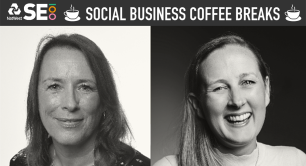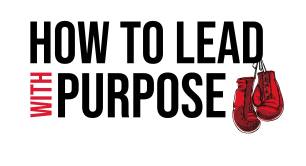How to crush imposter syndrome: ‘Be yourself. Be honest. Be open’
Celebrating every success, embracing vulnerability and being well prepared can help social entrepreneurs manage feelings of inadequacy, according to the expert speakers in our latest Social Business Coffee Breaks webinar.
It’s crucial to celebrate the little wins. This message echoed from the speakers throughout the latest SE100 Social Business Coffee Break webinar on ‘How to crush imposter syndrome’, which was hosted on 16 April by Pioneers Post founding editor Tim West and supported by NatWest Social & Community Capital.
The webinar featured a range of speakers who offered a variety of practical tips, tools and resources that attendees could draw on to manage imposter syndrome. They included Servane Mouazan, founder of Conscious Innovation, Cemal Ezel and Ken Love of Change Please, Liam Black, former social business CEO, leadership mentor and author, and Victoria Papworth, CEO of NatWest Social & Community Capital.
In the tradition of the Social Business Coffee Break webinars, the speakers told the audience what they were drinking during their coffee break. West chose the Adventurous Blend coffee from Change Please, a social enterprise which uses 100% of its profits to help house people experiencing homelessness and train them to become baristas.
Becoming more self-aware and accepting who you are
Delving into the etymology of the phrase ‘imposter syndrome’, Servane Mouazan (pictured), impact coach and founder of Conscious Innovation, said: “Going back to the Latin root of the word, an imposter is a person who takes advantage of someone by demanding their attention or commitment. Then there’s the word ‘syndrome’, which comes from the Greek words ‘drome’, meaning running and ‘syn’, which means together.” 
She added: “If you put all these things together [they refer to] a group of symptoms and coping mechanisms running around together in your head and body, that make you believe you shouldn’t demand someone’s attention.”
These symptoms, she said, were a product of an individual “internalising” negative assumptions created about themselves through their life experiences, education and interactions with others.
Mouazan recommended that attendees familiarise themselves with the five types of imposters, presented by Dr Valerie Young of the Imposter Syndrome Institute, to figure out which type best describes their approach: The Perfectionist, The Expert, The Soloist, The Natural Genius or The Superhuman.
After engaging attendees in an online exercise where they could select their character type, she urged them to dig deep and “think about the negative assumptions” that have triggered their symptoms of imposter syndrome.”
Ken Love, who was recently hired as managing director of Change Please, said that a big part of dealing with imposter syndrome was “about trying to just be yourself”. He said: “I remember always thinking that I had to be a certain type of person to be a success in business. But actually, as I’m going through life, I’ve realised: Be yourself. Be honest. Be open. It’s a barrier to try to do anything otherwise.”
Normalising vulnerability and de-stigmatising failure
Another piece of advice that the speakers gave was to be more transparent about your vulnerabilities and failures when leading a business.
Victoria Papworth (pictured), CEO of NatWest Social & Community Capital, said it was important to “be able to have an honest relationship of trust with your team”, where you could openly admit: “I’m at a four today. I’m not really feeling it, and I’m going to need you to come forward a little bit for me as I will come forward for you when you need it.”
Echoing this, West said: “Learning how to lead is also learning how to show vulnerability.”
Cemal Ezel, founder and CEO of Change Please, which started in the UK but has since expanded its franchise to Ireland, France, Australia and, more recently, the US, delved into how imposter syndrome had been a “byproduct of being an organisation that’s growing quickly”.
How he helped “take off the pressure” of imposter syndrome in his company, he said, was by “making people feel comfortable speaking about it, and taking away the stigma or shame”.
We want people to fail, otherwise you’re not going out of your comfort zone or breaking the status quo
He added: “We’re not employing people who are going to be completely out of their depth and make huge mistakes. Small, comfortable failures are completely fine, especially since we still see ourselves as a startup. We want people to fail, otherwise you’re not going out of your comfort zone or breaking the status quo. We normalise that feeling of failure without shame.”
The power of preparation
 Liam Black (pictured), leadership mentor, former social business CEO and author of How to Lead with Purpose, said: “Imposter syndrome is not something that can be crushed. iIt’s something that can be mitigated or managed. If you want to be in business you have to deal with it, whether it’s due to class, race, gender, etc. The higher you go up the ladder, the stronger it is.”
Liam Black (pictured), leadership mentor, former social business CEO and author of How to Lead with Purpose, said: “Imposter syndrome is not something that can be crushed. iIt’s something that can be mitigated or managed. If you want to be in business you have to deal with it, whether it’s due to class, race, gender, etc. The higher you go up the ladder, the stronger it is.”
Rather than adopting negative coping mechanisms, such as substance abuse, to try to erase the symptoms of imposter syndrome completely, Black recommended employing practical tools to help manage them.
If you are afraid of being found out, prepare well, so that you’re not found out
A key tactic to avoid feeling like an imposter, he said, was to be prepared. “If you are afraid of being found out, prepare well, so that you’re not found out. Make sure that when you go into that room, you’re all over your briefs, and the people that are with you have been briefed to be all over their briefs.”
Another useful behaviour, Black said, was to “consciously celebrate wins in the organisation”, adding: “I always try to start board meetings with some good news and some wins before we go into the sort of psychodramas of where we’re missing the mark.”
And there’s more – watch the webinar to explore:
- Cemal Ezel on the challenges of learning business and employment regulations across different countries and being “expected to be an expert”
- Liam Black on considering how verbal and body language can “suggest that you don’t belong in the room”
Recommended resources
 Listen to Good Leaders Podcast Episode 1 - Cemal Ezel: ‘I’m a good leader, not a good manager’
Listen to Good Leaders Podcast Episode 1 - Cemal Ezel: ‘I’m a good leader, not a good manager’
 Read research on imposter syndrome from Dr Valerie Young of the Imposter Syndrome Institute
Read research on imposter syndrome from Dr Valerie Young of the Imposter Syndrome Institute
 Watch Brené Brown’s TED Talk on “The power of vulnerability”
Watch Brené Brown’s TED Talk on “The power of vulnerability”
 Buy Liam Black’s book How to Lead with Purpose: Lessons in life and work from the gloves-off mentor or read our serialisation here
Buy Liam Black’s book How to Lead with Purpose: Lessons in life and work from the gloves-off mentor or read our serialisation here
Thanks for reading our stories. As an entrepreneur or investor yourself, you'll know that producing quality work doesn't come free. We rely on our subscribers to sustain our journalism – so if you think it's worth having an independent, specialist media platform that covers social enterprise stories, please consider subscribing. You'll also be buying social: Pioneers Post is a social enterprise itself, reinvesting all our profits into helping you do good business, better.




